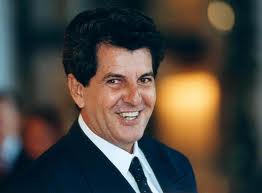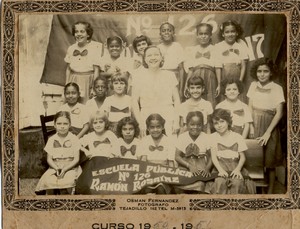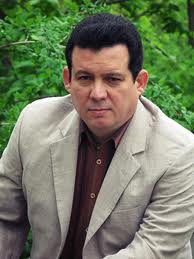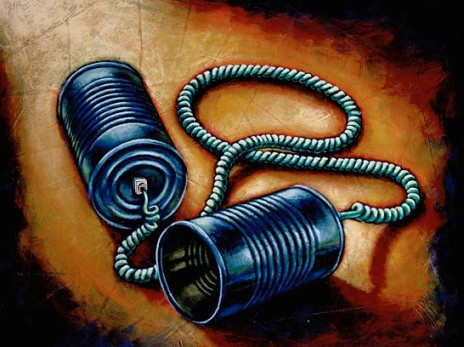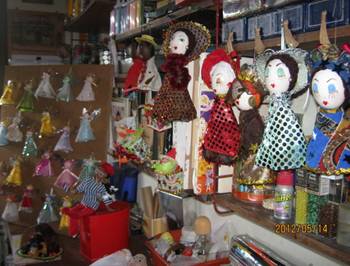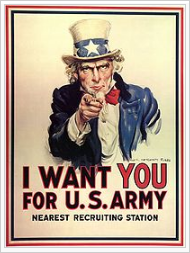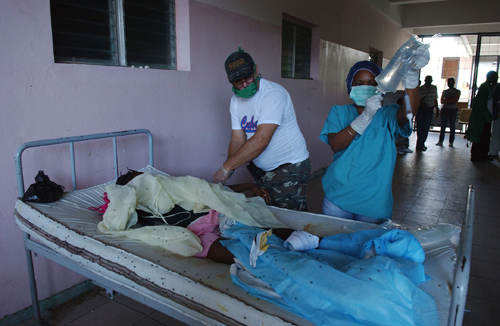By Daniel Morales
The writer Angel Santiesteban-Prats has been sentenced to five years in prison by the gang of assassins that, for more than 50 years, dominates every living creature that lives in the beauty and always Faithful Island of Cuba.
That sentence was so expected by Angel himself, like for all of us who, with him, have suffered the process that the repressive officials of the Castro Brothers’ regime have subjected the renowned writer to for the last two years.
And we couldn’t expect more from some criminals who, with the argument of a mulatto sergeant called Batista had inculcated us (that was one of the poor words used in every era by all sides in conflicts, while they were subjecting plenty of innocent victims to the heavy political speech of our prosperous republic) with liberties established by a Utopian constitution, approved since the decades of the ’40s of the last century, and they burst in, with their effective American submachine-guns, their stinky Galician berets, their lousy beards, their filthy long hair, and their hands stained with the blood of thousands of countrymen, in the lives of all the Cubans living and unborn.
Years later that bloodied wheel took Angel and me, when all those feudal lords, from an Spanish lineage of the Galicia region: stinking, full of brute people, ugly, filthy, fat, angry, racist, envious, boring, miserable, resentful, abusive, treacherous, cowardly (the part of Spain the sons of bitches dispute the Iberian throne with the Basque. I apologize to all Galician and Basque that are trying to feign, unsuccessfully, being evil doers, as their cultural fate inevitably has marked them) caught us in a dynasty whose cruelty is still ignored by all world institutions responsible for ensuring the life and dignity of the human beings who inhabit this, our only planet.
We are as Angel called us, The Children that Nobody Wanted, the victims, the serfs of the soil, the slaves, the offspring destined to satisfy the demands of the sons of a filthy Galician officer with the last name Castro, who came to the Island of Cuba with the satanic Valeriano Weyler, and who, imbued with the early fascist spirit of the Mallorcan bastard, initiated his illegitimate sons in the task of converting, as they did their Biran plantation, our mulatto island in a concentration camp worst than the perpetrated by the German Nazis.
Agony, death, grief, hunger, persecution, harassment, torture, suffering, chiefly that: a lot of suffering, I was trying to explain to my American son in my poor English or my profuse Spanish, when he asked me in the midst of his juvenile happiness in winning a tennis match, what I remembered about my youth when I was about the same age as his wonderful 14 years. I dared not recommend him my ineffective novel La Casa del Sol Naciente (The House of the Rising Sun), because Andy was so happy, he looked so beautiful in his happiness, that I found distasteful spoiling his perfect adolescence with horrors of my 30 years of agony on the Devil’s Island.
The capricious massacres of the modern island tyrants that still suffered by all the heretics who dare to defy, intellectually, the ignominious propaganda system that supports the Regime that rules the Island of Cuba, will be an stigmata that will hang over all the “intellectuals” who remain motionless and/or commit to that shit, who maintain, trembling and soft during their humiliating existence, showing off a category that doesn’t belong to them.
I think that Miguel Correa was the one who showed me in the beginning of my prolific exile on a clear night in his apartment in New Jersey on the banks of the Hudson River, under the influence of good wine and excellent marijuana, a copy of an essay about transgressions of his great friend Reinaldo Arenas. In the essay Arenas outlined the thesis that every artist is a transgressor, a kind of dissident, a heretic, that the great works are characterized by the break with the environment that contributed to it, or even fed it.
The extraordinary narrative work of my brother Angel does exactly that, there isn’t even one of his texts that I hadn’t read with a deep exaltation of all my feelings. His stories have a unique intensity in the Cuban narrative, only commensurate with the Stories of Lino Novas Calvo, but above all with the short North American narrative, which despite so many sorrows, has been the most influential for us.
The American writers are very interested in reality, or rather violence, sometimes very cruel, with which reality hits the human being.
From Poe or maybe from Melville, via Twain and all those geniuses of the so-called lost generation: Fitzgerald, Dos Pasos, Hemingway, Faulkner and Steinbeck, to the authors of dirty realism, who choose meticulously with their minimalist style those “real”pictures that allow them to create an unceasing chain of emotional impacts, that in most cases are enough to overwhelm the reader so much that he ends up hating the writer.
Authors like Charles Bukowski, Raymond Carver, the amazing Chuck Palahniuk, are some of the narrators who, like Angel, including those never published the Devil’s Island: Pedro Juan Gutiérrez and also our generational brother Amir Valle, set up an agonizing battle with their readers, a sentimental struggle where there are swarms of sublime traitors, vulnerable pedophiles, attractive homosexuals, mournful swains, romantic whores, the good cop, the happy alcoholic or the zombie drug addict.
All of them are writers who dare to teach us the colossal quantity of shit that the human being is able to produce, on our pathetic way to the death, in our stupid fight to survive this hell that we have to suffer.
But Angel’s narratives have something different from all these famous authors I mentioned, who despite their teaching us about the stinking part of our lives, despite their characters sharing that common hell, they don’t resign themselves to this wretched life they have to bear, and that’s why they reveal themselves; not in the way of the 19th century romantic heroes, who were looking for a glorious transcendence or a symbolic condition, eminence, no, nothing of Hollywood films with vigilante gunmen, or Japanese movies with samurais whose codes pretend an unlikely exaltation of the man.
The heroes of Angel Santiesteban-Prats make us fall in love with their extraordinary individual little flashes of light, adjusted to a certain narrative situation; those daily flashes that you and I are able to produce in the face of the injustice we find every day, e.g. in our work place, in our prison cell, in our homes, or in the neighborhood where we live.
Angel doesn’t want to be bad, he resigns himself to that satanic generational condition. That’s why he always gives a chance to all his characters; he doesn’t justify them but elevates them to an essential category, the human one. He doesn’t conceive that anybody could be so perverse as to not deserve love or a decent death, even when that death comes for a reason that the character doesn’t believe, doesn’t understand, and that in every case is foreign to him, indifferent, let’s say obligatory.
One writes as one can, and if sincere, as one is. To read the stories of my brother Angel makes me feel so nostalgic for those of us who know him in person, it’s like his image emerges from the text to give us a hug, to irradiate us, as no other writer of our lost generation, that sense of belonging to so strange a paradise, so hard to find in a world filled with so much false egomania, so much evil envy, as the world of art and literature of the Cuban Revolution.
To the narrators of my malevolent generation, our angel was Santiesteban: that big guy, cheerful, that I remember more than 6 feet tall, strong, with fat cheeks, so extremely humble as Amir says, that he used to appear on his fast German bike with an unbearable shyness to share with us some colossal perfect stories. We couldn’t envy him; his greatness was so sublime, so essential to Cuban literature, that we had to chill out, let it be, limit ourselves to crumpling up all the pages that we had drafted with so much effort in order to create our literature.
But he loved us so much that he needed us for living, one day not so long ago, he told me that without our presence there, without his dead brothers, murdered or emigrated from the Devil’s Island, without our fraternal literary competitions, without all those intense national meetings, it would be very hard for him to write the same texts, follow the thread, maybe without knowing, of the Greek masters who founded our occidental and superior culture.
Angel Santiesteban has chosen one of the ways that, unfortunately, we Cubans have suffered since our uncertain national foundation; I mean the category of martyr. Perhaps the beauty of our island is so out of proportion that it encourages perfection, to the extraordinary human condition, and it is the fact that the ugly “reality” produced by our countrymen contrasts so much with that nature, that provokes the extreme conflicts that our national conscience suffers.
I won’t ask for continental or Latin American solidarity for Angel’s freedom, because we Cubans have become accustomed, in these 50 years, to the solitude, to the neglected clamor in the desert, to the slights of all our brothers of the race. We are, as someone baptized us well, the “Jews of the Caribbean.” Hanging over our heads an unexplained curse, irrational, incomprehensible, that despite everything makes us invincible, like the scorned people of Israel, who face a crowd of satanic souls who appeal, with their Islamism, for the extermination of their human dignity.
But here we have those who, showing off their embarrassing membership in UNEAC (the Cuban Writers and Artists Union), thanks to the repressive system that enslaves us now have an excellent opportunity to redeem their guilt of being accomplices, actively or passively, of a regime that has surpassed all the horror of our national history with its evil. To redeem their guilt by going down in history with an act of courage, of intellectual honesty, signing or showing their rejection of the medieval regime ruling the Island of Cuba, which is trying to silence with five years in jail one of most extraordinary writers of our culture. Imagine that thanks to the modernity of the Internet there is a once-in-a-lifetime choice to be against an act like the assassination of the poet Placido or the liberation of the narrator Carlos Montenegro.
You, Cuban notaries, until now official typists for the Castros, here it is a unique personal option, redemptive. Given that your mediocre works are not going to surpass the colossal transcendental works of Heredia, of Martí, of Varela, of Villaverde, of Lezama, of Eliseo di Ego, of Lino, of Labrador Ruiz, of Cabrera Infante, of Lidia, of the madness of Virgilio Piñera, of Rafael Almanza, of Reinaldo Arenas, of Carlos Victoria, of Benítez Rojo, or of Amir Valle, I urge you to sign a repudiation statement against the false sentence given to the Cuban writer Angel Santiesteban-Prats, an act that would guarantee you, like that Dreyfus thing did for Solas and his followers, that so wished-for transcendence that you chase trembling and crouched down in a corner of the Cuban tragedy.
Here is the link to the intellectual Cuban posterity:
Lets see if you have the guts to sign this document; urging you is your friend, or foe:
Daniel Morales
Translated by: @Hachhe
December 16 2012




